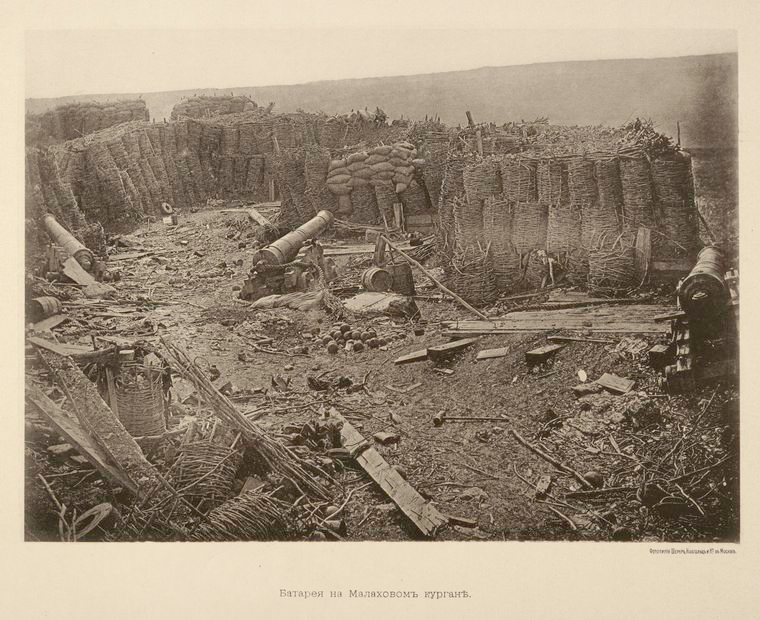The Ghosts of Crimea Before Richmond
When judging Civil War leaders, we sometimes look at them in isolation of a period or event, forgetting that they always act in accordance with the sum of their knowledge and experience to date. But remembering what has gone before in an officer’s career is sometimes the only way we can understand his decisions and actions.
Such an example is George McClellan in the 1862 Peninsula/Richmond Campaign. There are many reasons to criticize his leadership and generalship in that operation, but critics sometimes miss elements in McClellan’s biography that may help explain his thinking. One factor certainly has not received the attention it deserves: McClellan’s experience in the Crimea as an observer during the Crimean War. 
McClellan was the junior member of the three-man Delafield Commission, which travelled to the battle zone in 1855 as observers on behalf of the U.S. Army. The officers reached Sevastopol a month after the two-year siege had ended in an Anglo-French victory over the defending Russians. The climactic battle featured a massive artillery bombardment followed by a mass attack by 60,000 men over four days, 5-9 September 1855. The Commission spent several weeks studying the recent operations, analyzing weapons, tactics, logistics, medical services, and other aspects of what was then the most modern conflict available. Because of his cavalry background, McClellan was lead investigator of mounted operations, including a review of the famous Charge of the Light Brigade at Balaclava in 1854.
All three commissioners also inspected Sevastopol’s fortifications, and came away deeply impressed at their strength. One of Sevastopol’s key strongpoints, Malakov Redoubt, is pictured above after the siege. After returning to the United States, the men spent the next two years completing their voluminous report.
Compare the Malakov Redoubt with the famous pictures of the Yorktown defenses and the Richmond defense lines. When McClellan encountered these in the spring of 1862, was he in fact flashing back to Sevastopol and expecting a similar operation? Is this why he resorted to siege warfare so quickly at Yorktown and Richmond, and insisted on a massive siege train accompany the Army of the Potomac? Do his findings in Crimea also partly explain McClellan’s ambivalence to cavalry in the Peninsula Campaign?
How much do the ghosts of Crimea influence McClellan’s thinking in Virginia? We will never know for sure, but it must have been a factor – one that should be remembered in any analysis of George McClellan in the spring of 1862.
One of the reasons I value Ethan Rafuse’s biography of Mac (“McClellan’s War”) is the he kind goes into this point. I think it is very much on-target.
Thank you very much. Glad you liked it.
Great point! I’d forgotten that McClellan got to travel internationally to observe war. Thanks for the nice article.
Glad you liked it!
People rely on their experiances to guide their actions. Of course history is full of cases where people or nations have prepared to replay the last big event and been caught out by progress. This is probably another example.
His vast overestimation of the enemy forces was far more debilitating to his strategic thinking and ability to move on Richmond with purpose.
Crimea experience, pre-war rank, and early war hype all contributed to his vast overestimation of himself and his ability to prosecute the Union war effort in general and this campaign in particular.
With my amateur psycho-analyst hat on I would say that deep down, he knew that he didn’t have the vision and wherewithal to do what all expected and he created obstacles so great that his caution seemed justified.
With my regionally biased glasses on I would say this is typical or archetypical of well bread well educated East Coast 30 something that are promoted for their resume not their ability.
He was all pomp but no punch.
That is just one Midwesterner’s unprovable take on this “professional” soldier’s unmitigated failure as commander of troops and the Union war effort.
Now if you excuse me, I will go back to my ordinary and absent of achievement life.
Trent
Very good observation, I always appreciate the insight you bring from other wars. But I still think Little Mac is a wimp.
I wrote an alternate plan paper at Mankato State Univ. back in 1988 on military reforms of the Crimean War (the post makes me realize my paper is more pertinent to my Civil War research than I thought), and even had a copy of the Delafield Report, but I never connected the dots ref. the Malakof Kurgan/Redoubt and Yorktown. Will have to see Rafuse’s book, in which Mac’s aversion to cavalry may be addressed, but if someone knows something about said aversion, please let me know. I’m trying to get more info on “Hairy Mary,” the Brit loco at Sevastopol protected with heavy ropes, as I’m writing a book (“Enigmatic Armor”) on shielded and ironclad locos, cars, trains, etc. Wrote “Mars Gets New Chariots: the Iron Horse in Combat, 1861-65” in 2006. I’ve seen a pic of Mary in Potselyuyev’s book on armored trains, as well as in a Brit book on same. BTW, the Union armored or, more precisely, “protected” locos, so I’m wondering if they did so with Mary in mind.